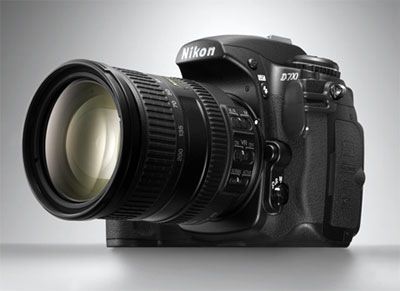It may not always be clear why a camera manufacturer, such as Nikon, introduces one model, then a similar one, and later decides to design a third one that is between the other two, in terms of specifications and features. That is what the Nikon D700 DSLR camera represents, however. It’s closer to the D3, but also contains some of the capabilities of the D300. Whether Nikon’s reasoning makes any sense is rather immaterial, since the D700 seems to achieve its ends, which was to be Nikon’s first “compact” professional DSLR and at a more affordable price point (approximately $2,700 body only, compared to $5,200 for the D3, body only).

Part 1 of this PhotographyTalk.com article presents some of the D700’s features and functions that make it such an excellent choice. Part 2 includes a few more.
Nikon gave the D700 the same large, high-resolution LCD monitor that is found on the D3 and D300. With approximately 922,000 dots in 1,920 columns by 480 rows, the three-inch screen reproduces extremely detailed images. To dig a bit deeper, all those dots are actually red, green and blue sub-pixels, which are both thinner and packed closer together. When grouped in threes, they become one, full-color pixel. The clarity of the image is truly something to behold, especially in live view and playback modes. Less magnification is required in playback to identify sharpness, focus precision and any digital noise.
Not only are those image qualities easier to recognize, but also the images from the D700 are nothing short of amazing. They appear almost digitally “pure,” and noise is near invisible. The picture quality also provides plenty of flexibility, in terms of precise enhancement of the sharpness, contrast and saturation settings, whether processing occurs in-camera or on a computer. Incredibly, the D700 has approximately five stops of RAW latitude; so extreme highlight detail can be successfully adjusted, even when it appears to be beyond rescuing.
Fortunately, Nikon choose the D700’s ISO function to be more like the D3’s, which means acceptable images, in general, can be shot at a high ISO of 12,800. This is accomplished with very large photo sites on the full-frame sensor and a noise-reduction principle that emphasizes chroma noise more than luminance noise. The Nikon D700’s ISO specification is actually as much as 25,600, which may be pushing it, but it does mean photography is still possible under even lower light conditions.
The D700’s speed is fully competitive with cameras at the same price point. Read/write and buffer times, shutter lag and power on are superior and, the 5 frames-per-second, continuous shooting should be more than satisfactory for most photographers, considering this camera. Eight frames per second are possible, which approaches the D3’s capability, when the optional battery grip is employed, and its large EN-EL 4a or AA batteries. The only negative is 8 fps is not available in DX mode.
Other Minor Flaws
Any other flaws of the Nikon D700 are truly minor, or a trade-off. For instance, the 12-megapixel sensor is probably more than adequate for many photographers; however, some competitors, in the same price range, have almost twice as much resolution. Plus, one of them, the Canon 5D Mark II includes HD video. The average resolution of the D700 is offset by its spectacular speed and ISO range.
The D700’s auto white balance function is somewhat undependable in artificial light and the sharper default tone curve can produce clipped highlights. Using custom white balance and changing the default settings can easily resolve both of these “problems.” Better yet, shoot RAW and forget about them.
Nikon has certainly made its mark in the “compact,” professional DSLR category with the D700. All of its many features and capabilities put it above average to excellent. Add its smaller body profile and price (almost half of the D3) and the Nikon D700 becomes a top-of-the-list choice for many serious enthusiasts and professionals.